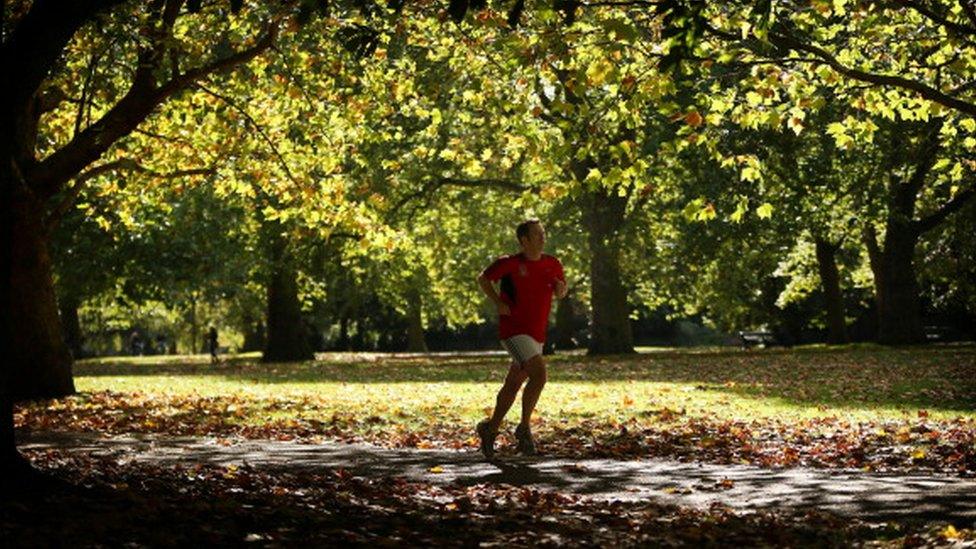The patients inspired to take up parkrun by their GPs
- Published
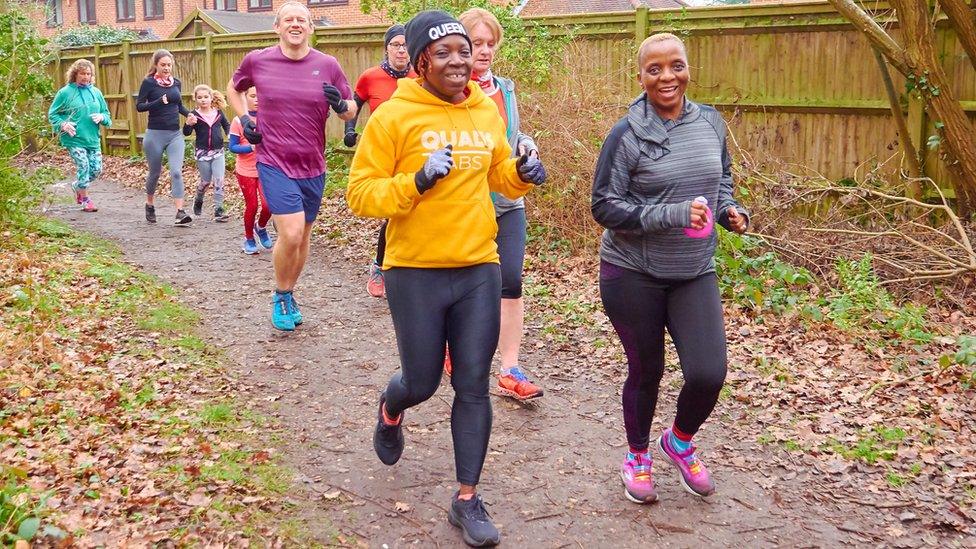
Parkrun can help with a number of health conditions, including high blood pressure, diabetes, heart disease, anxiety and depression
In the past 18 months, some 1,500 GP surgeries have signed up to encourage patients to take part in their local parkrun. Those who never thought they could run 5km (3 miles) and now consider the event a lifeline describe how the experience has improved their health and outlook.
'It's changed my life'
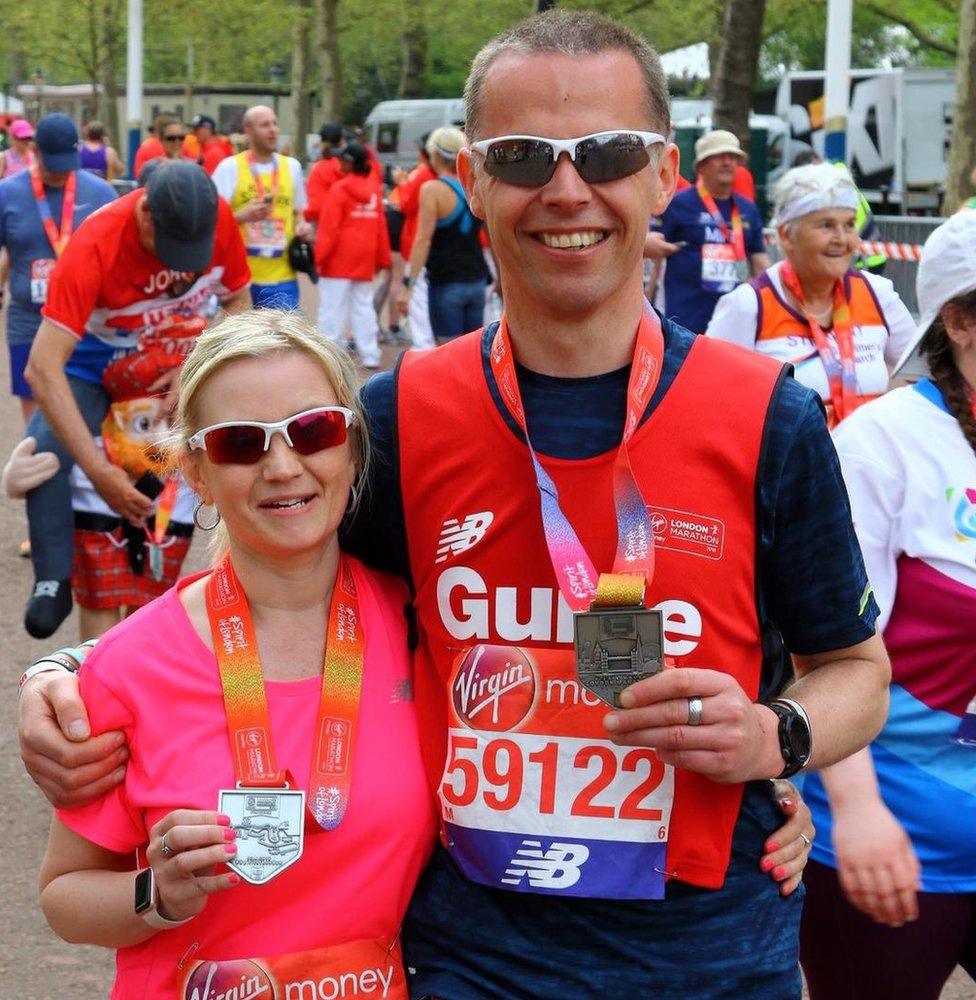
Kelly Barton says she would never have completed the London Marathon if it wasn't for her doctor suggesting parkrun
Kelly Barton has no vision in her right eye and a tiny amount of sight in her left. She was registered blind at birth and at 40, had never gone for a run.
Though she went to the gym, she had always been told by trainers that running would be "too difficult and inaccessible" for her. When she trained with a group, she stayed inside while others in the session went running and used a rowing machine instead.
She told her GP Simon Tobin how she "never truly felt part of their community", which is when he offered to guide her around the Southport parkrun.
"It's really difficult to describe to anyone who can see just what it feels like to suddenly not have a cane in your hand," says Miss Barton.
"With a cane I feel in control of what I'm doing and when you're holding someone's arm, you're relying them to give you directions, it was a little bit daunting and I had no concept of how far 5k was."
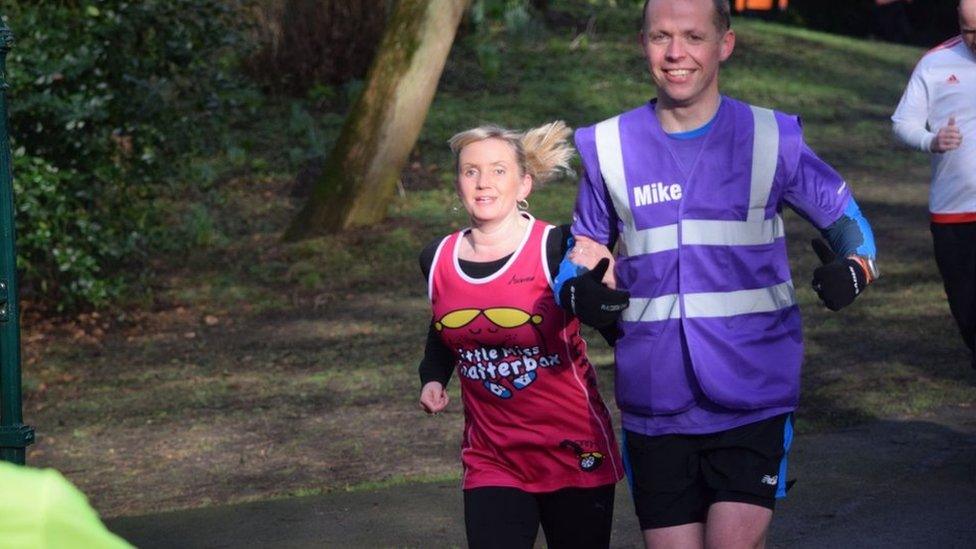
Kelly regularly runs with her guide, Mike
Miss Barton completed her first parkrun in just under 45 minutes. Since then, she has taken part in more than 120 runs, many with her regular guide Mike, and got her personal best down to 22 minutes and 35 seconds.
She has also gone on to complete 10km (6 mile) races, half marathons and the London Marathon - with plans to do the latter again this year. The Salvation Army worker says her life hasn't been the same since she started running.
"I never thought I would do anything like that and if it wasn't for Dr Tobin telling me about parkrun, I don't think I would have. It's a really friendly community and I feel part of it. It can be isolating when you can't see but it's great that I can just get up on a Saturday morning like everyone else and go and do parkrun."
'I've got my confidence back'
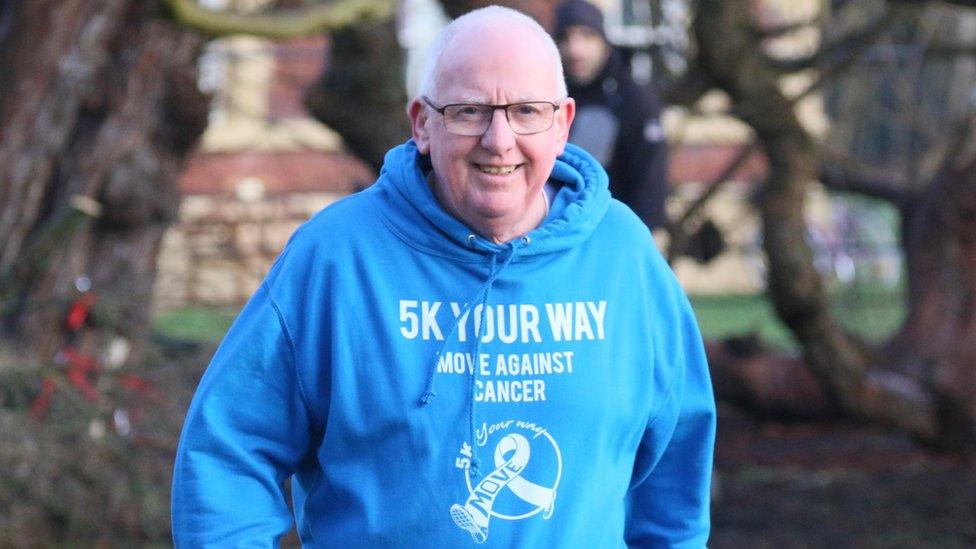
Patrick Quinn finds parkrun helps his mind while he cares for his wife
Patrick Quinn started running after his wife Helen was diagnosed with incurable cancer. At the beginning of 2019, after three years of fighting the disease, doctors discovered more tumours on her liver and the toll on his mental health became clear to him.
"While keeping up a brave face for Helen and the family, I was finding it very difficult to cope with watching the person I loved suffering and not being in a position to help her. I started to feel depressed and I started to cut myself off from friends and people who had supported us as I couldn't face the constant questions about how is Helen doing.
"Then I realised that I needed help."
Mr Quinn went to his GP and recalls being "very anxious" in the waiting room. To distract himself, he started to read the notices, including one about 5k Your Way - Move for Cancer. He said afterwards, he went for a long walk to clear his head and kept thinking about the poster. When he got home, he got the details off the surgery's website.
"I now had a goal, something to focus on," he says.
The practice staff told Mr Quinn the monthly parkrun group at Lytham Hall was formed to help people like him who were looking after or supporting loved ones with cancer.
"I did my first run/walk and afterwards we all went for a coffee," he says. "For the first time in months I was able to relax and enjoy listening to other people who were in the same or a similar position to me," says the 67-year-old.
"When I told my family what I had done they were fully supportive and now look forward to hearing how I've got on after each run."
He has now completed seven parkruns and continues to look after Mrs Quinn as she continues to go through treatment.
"It has given me my confidence back and introduced me to some amazing positive, friendly and supportive people. I have something to focus on and talk about and I feel that I am doing it for Helen and the family."

Are doctors 'prescribing' parkrun?
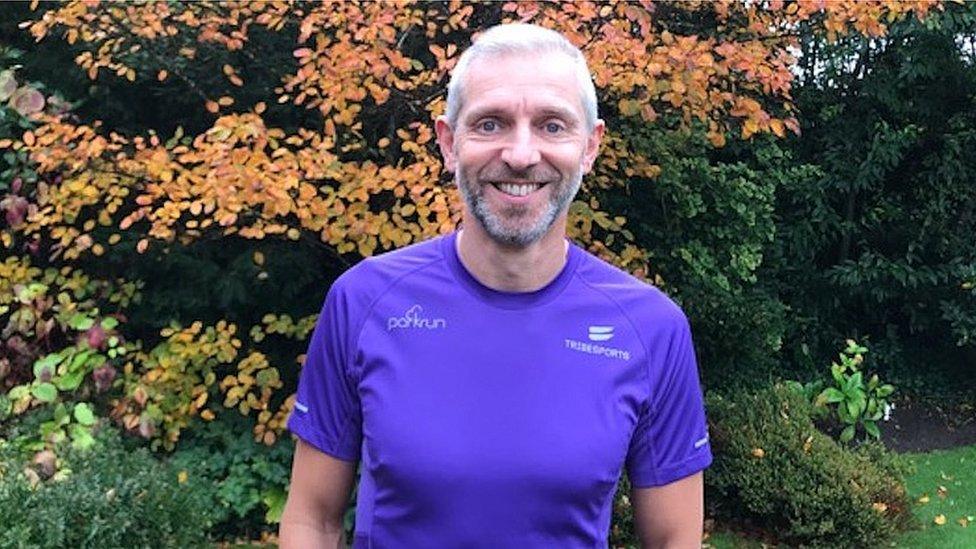
Dr Simon Tobin's surgery became the first "parkrun practice"
Dr Simon Tobin was a forerunner in getting his patients to take up parkrun. The Southport GP started taking part in the event in his home town in 2016 and bumped into a lot of his patients, which "instantly" inspired him to start promoting the health benefits to those coming to see him at Norwood Surgery.
His became the first "parkrun practice" - an initiative launched by the Royal College of General Practitioners (RCGP) 18 months ago - and he became a parkrun health and wellbeing ambassador.
He says 20% of practices across the UK have signed up and parkrun has helped benefit patients with high blood pressure, diabetes, heart disease, stress, anxiety and depression.
"It's astonishing, I was hoping we would just get 20 to sign up when we started," he says.
"People have turned their health conditions around. Three years ago I thought it was about the exercise, that was where the benefit came from, but I've come to realise it's about more than the physical exercise.
"Walking and running is a great thing but actually it's a great group of people getting together and spending a brief period of time with each other. All of a sudden we have something in the middle of Southport and hundreds of places across the country where people are connecting and getting together, that's really where the magic happens."
You might also be interested in:
'How Pokémon Go has changed my life'
Sunken chest syndrome: 'I'm being strangled inside'
The parents raising their kids on the road
The University of Warwick is looking into how parkrun is being suggested to patients.
"I think the term 'signposting' is preferable to 'prescribing' when talking about patients, parkrun and becoming more active and part of the community," says research fellow Jo Fleming.
"The parkrun organisation, RCGP and primary care trusts are not wanting to medicalise parkrun, but rather make people aware of it as a real possibility for them to improve their health and wellbeing."

'I have no regrets'
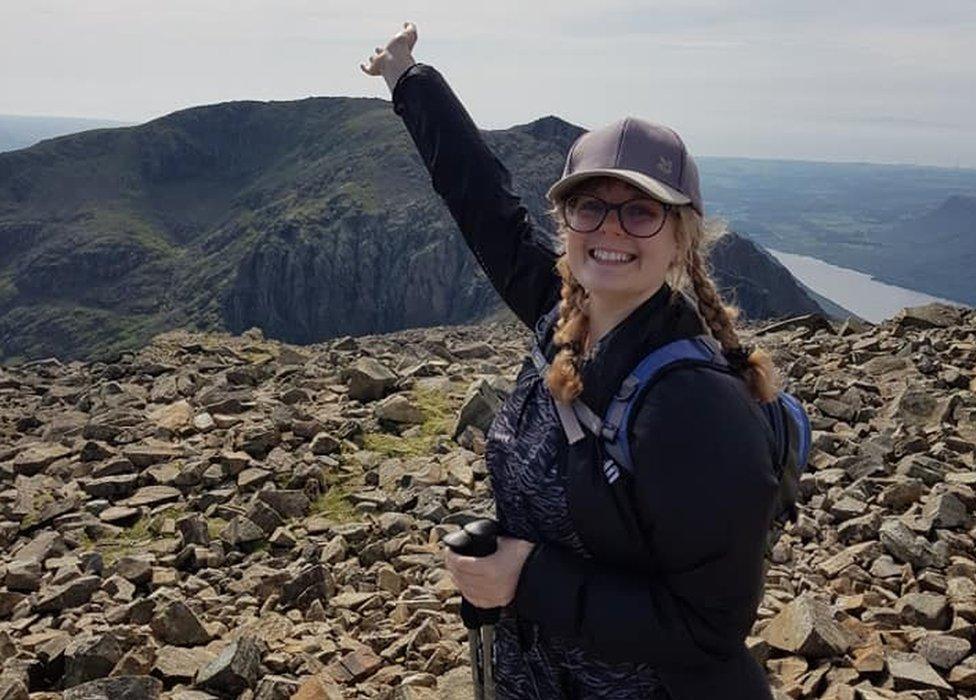
Sam Smith saw a poster for parkrun while in the waiting room at her doctors' surgery
Sam Smith's asthma is so severe it has landed her in A&E and left her taking multiple prescriptions for antibiotics and steroids. When the 26-year-old from Derbyshire saw an advert for parkrun in the waiting room at her surgery, she spoke to a GP who encouraged her to take part.
She says she had always avoided running for fear she would have an asthma attack or it would increase her pain levels. But neither of those things happened when she turned up for her first race in Burton upon Trent in February 2019.
"I took it at my own pace and didn't feel pressured at all, the crowd are so supportive and this encourages you to continue," she says.
It took Ms Smith about 45 minutes to finish her first run. Since then, she has gone on to complete 10 more, shaving almost 10 minutes off her personal best, and has also gone on to complete the Derby 10km.
It has helped her condition so much so she is encouraging others with asthma to take up parkrun.
"Do it at your own pace. There is absolutely zero pressure at a parkrun and people will run past and ask if you're OK. You're an asthmatic and you're trying to improve your asthma, that's an excellent step.
"There are helping hands everywhere you look and so don't be embarrassed if you need to stop. When you cross that finish line all red and a little breathless, you will be so proud of yourself. I have no regrets."
- Published25 December 2019
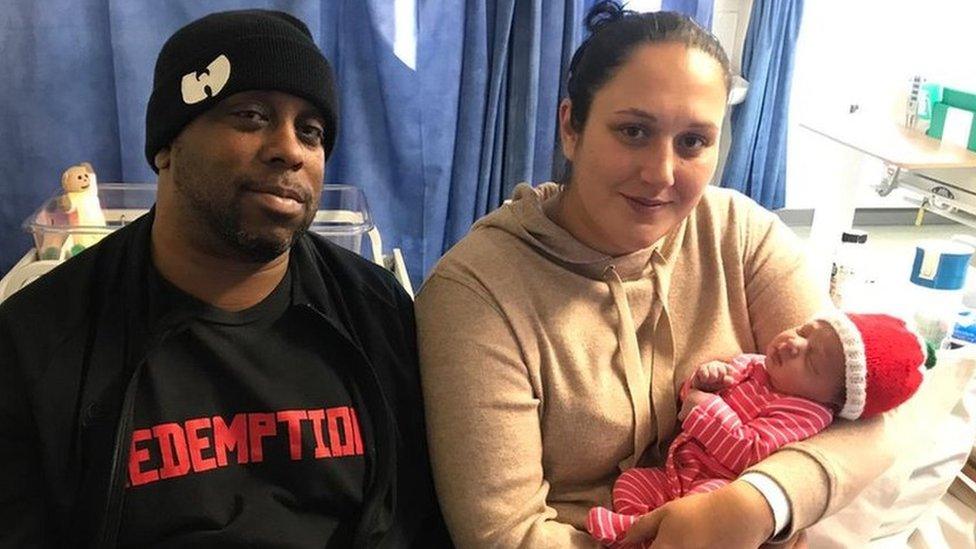
- Published21 December 2019
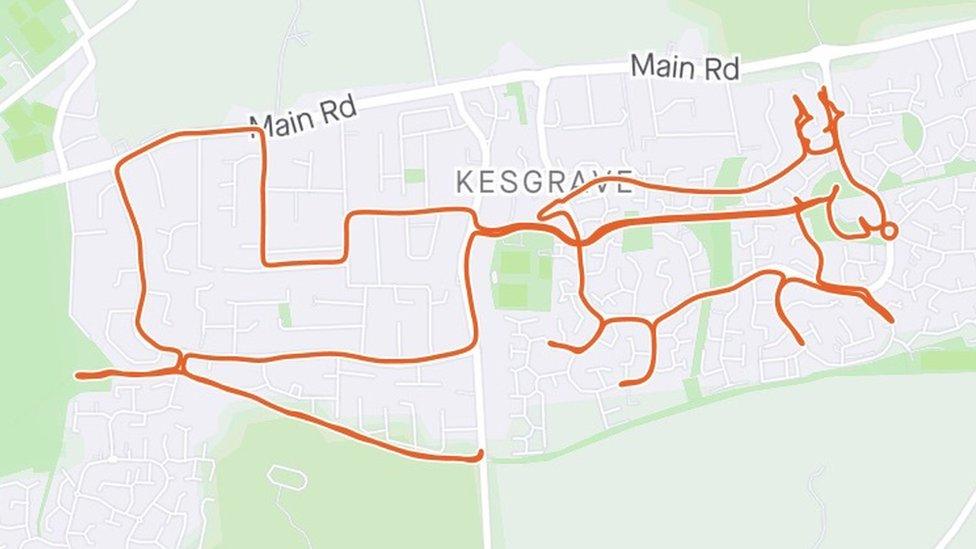
- Published13 April 2019
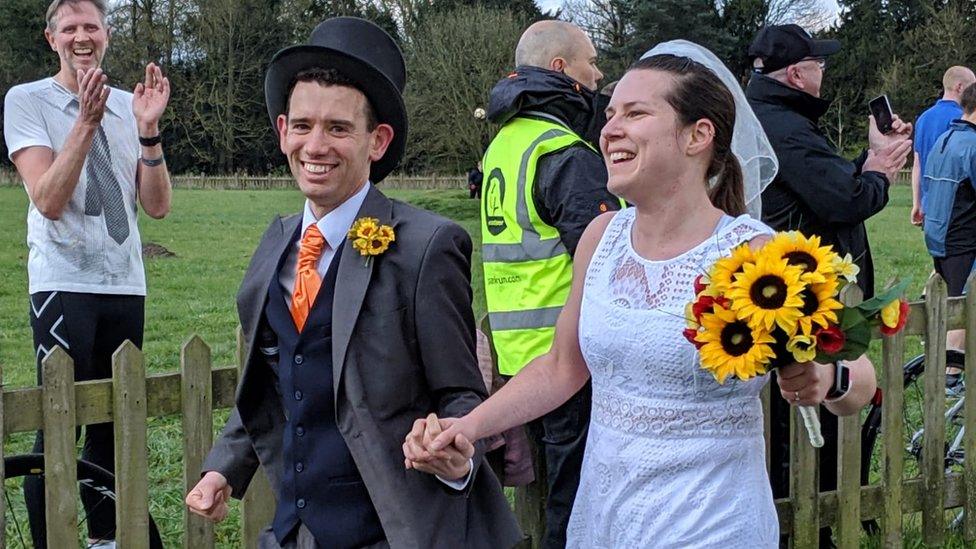
- Published6 October 2018
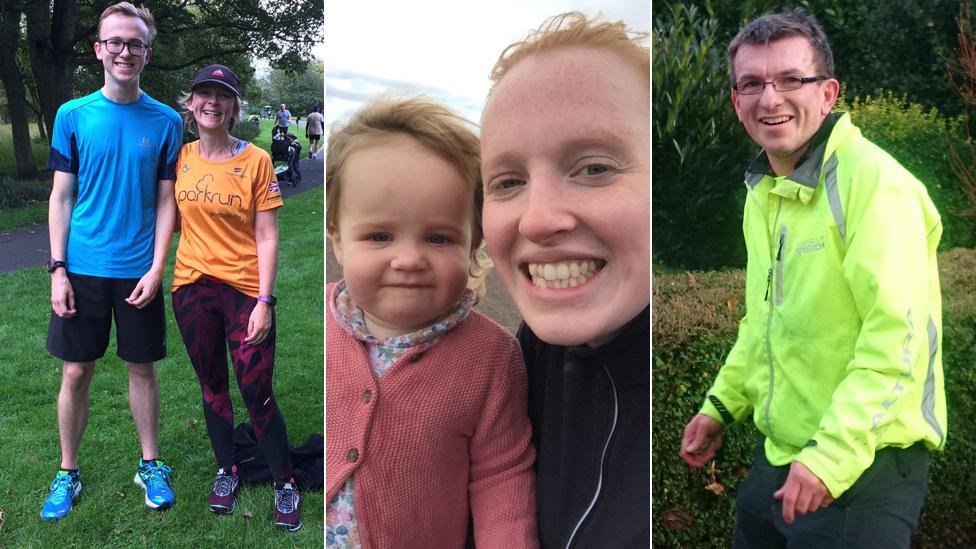
- Published12 April 2016
